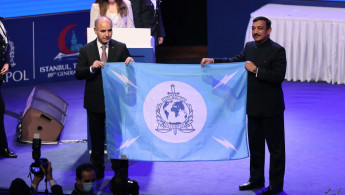Syrian regime participates in INTERPOL general assembly in Istanbul
Syria participated in INTERPOL’s three day-long general assembly in Istanbul this week where member states voted on new resolutions for the global policing body.
Syria’s attendance comes after INTERPOL lifted corrective measures on the state in October, granting it access to the organisation’s communication networks. Human rights activists expressed fear over the move, warning that Damascus could abuse INTERPOL’s policing tools, such as red notices, to pursue dissidents abroad.
INTERPOL is an international policing organisation meant to facilitate transnational cooperation to combat crime, particularly those concerning children, as well as human and drug trafficking.
The organisation is made up of 195 member states which meet once a year to vote on resolutions which will then be carried out by a higher executive committee, a 13-member body.
The organisation has been plagued by accusations that it is used by despotic governments to punish political opponents, despite INTERPOL’s stated commitment to be apolitical. The tool that has attracted the most ire in INTERPOL is red notices.
Member states can issue red notices for individuals, which are similar to international arrest warrants that other member states can choose to act upon. Red notices go through a review process before being published, but many critics say the process is deeply flawed, pointing to abuse from states like Bahrain, the UAE and Turkey.
States can also issue “diffusions” which are the same as red notices, except they are issued directly from countries to other member states in INTERPOL, instead of going through the organisation’s General Secretariat. Diffusions also do not have to go through a review process before being published.
The organisation attracted controversy and condemnation by human rights bodies after electing Ahmed Nasser al-Raisi, a UAE military general accused of torture, to be its next president.
This year’s General Assembly voted on several resolutions, including the successful admittance of Micronesia to the organisation. However, the resolutions adopted fell short of enacting reforms that addressed criticisms of abuse.
"The 89th General Assembly passed zero reforms with regard to its redress mechanism; all of the mechanism's flaws remain unaddressed," Yuriy Nemets, a Washington D.C. based attorney who specialises in representing victims of INTERPOL abuse, told The New Arab.
"The already strained budget of the Commission for the Control of INTERPOL's Files [meant to protect victims of INTERPOL abuse] has been left virtually unchanged, despite the fact that the Commission has been reporting an increase in its caseload," Nemets said.
Nemets added that despite the General Assembly making it a point to pass some reforms to make the election of the organisation's president more transparent and to pass a code of conduct for the body, the election of al-Raisi is concerning.
"Not only is the UAE known for abusing INTERPOL, the vote for Al Raisi came despite the serious allegations made against him and the country’s regime in the media," he said.
INTERPOL Secretary General Jürgen Stock said on 25 November that the organisation is "very committed to applying our rules and standards to making sure every information is compliant with rules and regulation and human rights standards.” He also assured reporters that INTERPOL strives to stay out of politics and not to be complicit in abuse by member countries.
In the opening of this week’s General Assembly, Turkish President, Recep Tayyip Erdogan, said that he expects “strong solidarity” and cooperation from INTERPOL in the extradition of Gulenist “terrorists.”
Erdogan has long accused Fethullah Gulen, an Islamic scholar considered to be in opposition of Erdogan, to be behind the 2016 attempted coup in Turkey. He has continually requested the United States extradite Gulen from his residence in Pennsylvania to Turkey, which the US has refused.





 Follow the Middle East's top stories in English at The New Arab on Google News
Follow the Middle East's top stories in English at The New Arab on Google News


